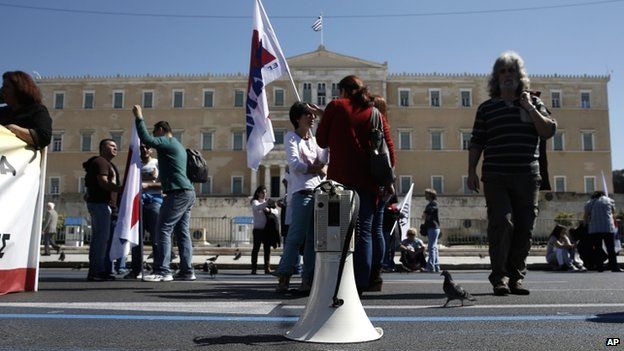Eurozone approves next Greece bailout payment
- Published

Eurozone ministers have signed off the next 8.3bn euro (£6.8bn; $11.4bn) instalment of Greece's bailout.
A first tranche of 6.3bn euros will be paid at the end of April, Eurogroup chairman Jeroen Dijsselbloem said at a meeting of finance ministers in Athens.
Two more payments of 1bn euros will be made in June and July, he added.
Ahead of the meeting, demonstrators were barred from parts of Athens including Syntagma Square, the focus of recent anti-austerity protests.
Greece, the current chair of the EU presidency, continues to struggle with high debt and unemployment.
Discussions at Tuesday and Wednesday's meetings include Greece's austerity programme and market reforms demanded under the terms of its international bailouts.
Renewed confidence
The latest bailout is one of the last Greece will get from the eurozone. The International Monetary Fund will continue to pay its instalments for some months.
It comes after the Greek parliament narrowly passed a raft of reforms, mainly to open up retail sectors to competition.
The BBC's Mark Lowen in Athens says the latest bailout announcement comes amid renewed optimism about Greece's economic recovery.
Greece has wiped out its deficit, except for interest on its debt, and is forecast to exit six years of recession this year.
Athens hopes the progress will spur the Eurozone to consider debt relief in the coming months, by lowering the interest rate on its loans or extending the repayment period, our correspondent adds.
But unions and left-wing groups have called for mass protests on Tuesday.
They say people are still suffering under the austerity measures implemented under the bailout terms.
Unemployment is running at 27%, and many Greeks are still feeling the effects of tax rises and spending cuts.
It is unclear whether protesters will attempt to enter prohibited areas and try to reach Syntagma Square.
Athens has enforced protests bans in the past, including when German Chancellor Angela Merkel made high-profile visits.
- Published9 January 2014
- Published5 December 2013
- Published11 December 2013
- Published13 February 2014